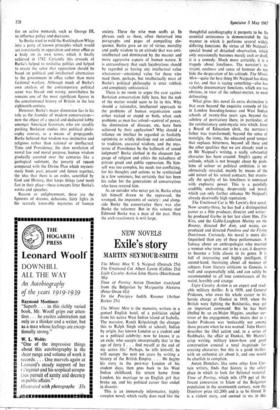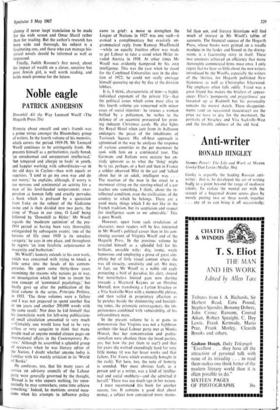NEW NOVELS
Exile's story
MARTIN SEYMOUR-SMITH
The Mimic Men V. S. Naipaul (Deutsch 25s) The Unaltered Cat Albert Lewin (Collins 21s) Light Cavalry Action John Harris (Hutchinson 30s) Time of Parting Anton Donchev translated from the Bulgarian by Marguerite Alexieva (Peter Owen 42s) To the Precipice Judith Rossner (Arthur Barker 25s) The Mimic Men is the memoirs, written in a genteel English hotel, of a politician exiled from his native West Indian island of Isabella. The narrator, Ranjit Kripalsingh (he changes this to Ralph Singh while at school), Indian by origin, has known London as a student and as a political celebrity; now he knows it as an exile, who accepts unsurprisedly that `at the age of forty I . . . find myself at the end of my active life.' Perhaps, he tells himself, he will occupy the next ten years by writing a history of the British Empire. . . . He begins his story in the post-war London of his student days, then goes back to his West Indian childhood, his return home from London, his marriage to an English girl that broke up, and his political career that ended in disaster.
This is an immensely informative, highly complex novel, which really does read like the thoughtful autobiography it purports to be. Its essential seriousness is demonstrated by the manner in which it performs several widely differing functions. By virtue of Mr Naipaul's special brand of detached observation, which only occasionally becomes merely arch or droll, it is a comedy. Much more certainly, it is a tragedy about loneliness. The narrator's re- straint, coolness and sense of humour do not
hide the desperation of his solitude. The Mimic Men—quite the best thing Mr Naipaul has done
so far, and that is saying something—also has valuable documentary functions, which are too obvious, in view of the subject-matter, to need delineating.
What gives this novel its extra distinction is that even beyond the exquisite comedy of life in London boarding-houses and West Indian schools of twenty-five years ago, beyond the subtlety of portraiture (here, in particular, of the revolutionary semi-mystic into which, from a Board of Education clerk, the narrator's father was transformed), beyond the sense of nostalgia, the irony, the educated good temper that replaces bitterness, beyond all these and the other qualities that we are already used to in Mr Naipaul's writing, a really substantial character has been created. Singh's agony of solitude, which is not brought about by prob- lems of colour or political ambition, is un- obtrusively revealed, mainly by means of the odd nature of his sexual contacts; but eventu- ally the quality of his loneliness is conveyed with explosive power. This is a painfully credible, enchanting, desperately sad novel, which can only further enhance Mr Naipaul's already deservedly high reputation.
The Unaltered Cat is Mr Lewin's first novel. Now seventy-three, he has had a distinguished career as a film producer, director and writer: he produced Garbo in her last silent film, The Kiss, and the Gable-Laughton Mutiny on the Bounty, directed Be! Ami, and wrote, co- produced and directed Pandora and the Flying Dutchman. Curiously, his novel is more dis-
tinguished than any of these performances. A fantasy about an anthropologist who married a woman who turns out to be a cat, it deserves to become a little classic in its genre. It is full of interesting and highly intelligent, if second-hand, theorising about all manner of subjects from literary criticism to Genesis, is well and suspensefully told, and can safely be recommended to all 'true connoisseurs of the weird, horrible and strange.
Light Cavalry Action is an expert and read- able military thriller. It is 1939, and General
Prideaux, who owes his whole career to his
heroic charge at Dankoi in 1919, when the British were fighting the Bolsheviks, may get an important command. But he has been
libelled by an ex-Major Higgins, another sur- vivor of the engagement, who insists that as a leader Prideaux was 'noticeably not among those present when he was wanted.' John Harris describes the libel action and, in a series of flashbacks, the affair at Dankoi. Mr Harris's crisp writing, military know-how and good construction conceal a total inaptitude for creating character; but this is a good thriller, with an authentic air about it, and one would be churlish to complain.
Anton Donchev, like some other Iron Cur- tain writers, finds that history is the safest place in which to look for fictional material- Time of Parting, which tells (379 pp) of the forced conversion to Islam of the Bulgarian population in the seventeenth century, won the Dimitrov prize (£1,200) and is to be filmed. It is a violent story, and seemed to me in this
clumsy if never inept translation to be made for the wide screen and Omar Sharif rather than for reading. But the author's research has been wide and thorough, his subject is a fascinating one, and those who can manage his- torical novels should be informed as well as impressed.
Finally, Judith Rossner's first novel, about the impact of wealth on a clever, sensitive but poor Jewish girl, is well worth reading, and holds much promise for the future.



































 Previous page
Previous page